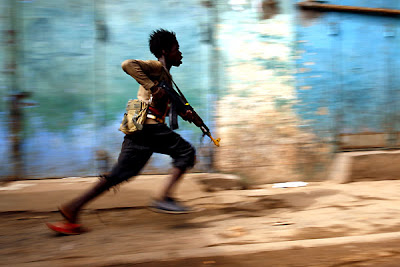
Johnny Mad Dog doesn't waste any time in plunging the audience right into its world. The opening moments are brutal and intense. An African village is under attack from marauding soldiers, but these attacking forces are just kids, some of whom are brandishing guns almost as big as they are. The leader of the platoon is a teenager who goes by the name of Johnny Mad Dog (Christopher Minie), and along with his right-hand man, the self-aggrandising No Good Advice (Dagbe Tweh), he leads them into ever more violent encounters in the hunt for government sympathisers. This raid ends with a young local boy being forced to shoot his own father, and then the troop launch an attack on a state-controlled TV station, which climaxes with multiple murders and the rape of a female news presenter.
It's hard to watch such horrific acts being perpetrated by children, who seem to have no moral qualms and no sense of remorse about what they are doing. They have been brainwashed by their commanders, who feed them drugs and propaganda, but it's clear that these kids don't understand the war they are fighting (at one point, a speech from Martin Luther King can be heard on a radio. The boys believe it is the President). Director Jean-Stéphane Sauvaire compounds this sense of unease by shooting Johnny Mad Dog in a restless and nervy handheld style, forcing us to get closer to the action than we might be comfortable with. It proves to be a double-edged sword. There's no question about the film's authenticity; Sauvaire shot the film in Liberia, and a number of his cast members experienced events similar to those depicted in the film firsthand, during the country's two recent civil wars. But the director's determination to give us a raw, unflinching account of a conflict waged by teenagers eventually palls. After sitting through scene after scene of kids shouting at and killing each other, the relentless cacophony simply has a numbing effect.
Some respite is offered by the film's parallel narrative, which follows 16 year-old Laokolé (Daisy Victoria Vandy), as she tries to protect her younger brother and disabled father, transporting them to a UN hospital while avoiding the bloodshed in the streets. She has a sense of goodwill and calm that is alien to Johnny Mad Dog and his crew, but her scenes never come to life, partly because Vandy is a limited actress, and as such the ceaseless savagery of one half of the story overwhelms the movie. As impressive as Sauvaire's depiction of events is, and as convincing as many of the young actors are, the film's relentlessness does prove to be a test, and I wondered whether there was anything substantial behind the noise and fury. Fortunately, there are moments in the film's latter stages, when Johnny and his fellow soldiers let their masks slip. For all of the brilliantly realised carnage in Johnny Mad Dog, it is these moments that are the most vivid, the moments when we see them for what they really are: lost, confused, and nothing more than children.
